
Some 60 of the women clergy of the Diocese of Los Angeles gather after the convention Eucharist for a photo with celebrant (and later keynote speaker) Carter Heyward, one of the first women ordained to the priesthood in The Episcopal Church. The Eucharist and the convention celebrated the 50th anniversary of that 1974 event. Photo: Janet Kawamoto

Carter Heyward, one of the Philadelphia 11 ordained in 1974, pepares to preside at the convention Eucharist. Photo: Janet Kawamoto
[The Episcopal News] The Rev. Carter Heyward and the Rev. Norma Guerra – key speakers at the Nov. 9 annual meeting of the Diocese of Los Angeles in Riverside – issued rousing calls to action, to love and to pursue justice in the uncertain aftermath of the recent contentious presidential election.
“My call to myself; my call to us all this afternoon, is to stay alert and not let ourselves as church be lulled into any kind of quiet complicity, by pretending that we are above politics or outside of it … that we ought not to take sides,” said keynote speaker Heyward, one of the Philadelphia Eleven, whose 50th ordination anniversary was commemorated during the convention.
And Guerra, who preached at an all-female-led opening Eucharist, said she’d attended the convention’s screening of the Philadelphia Eleven documentary, viewing it a fifth time. “It doesn’t matter how many times I see it; it always touches my heart and fills me with gratitude for their strength, their sacrifice and their unwavering moments.”
Amid applause, she turning to Heyward and added: “I am so deeply grateful to all of you, and I am glad I can see you in person. You opened the doors for all of us.” Hearing election results gave Guerra the feeling “that this is how our sisters may have felt 50 years ago, against all odds, that July 29, 1974 day at the Church of the Advocate.”
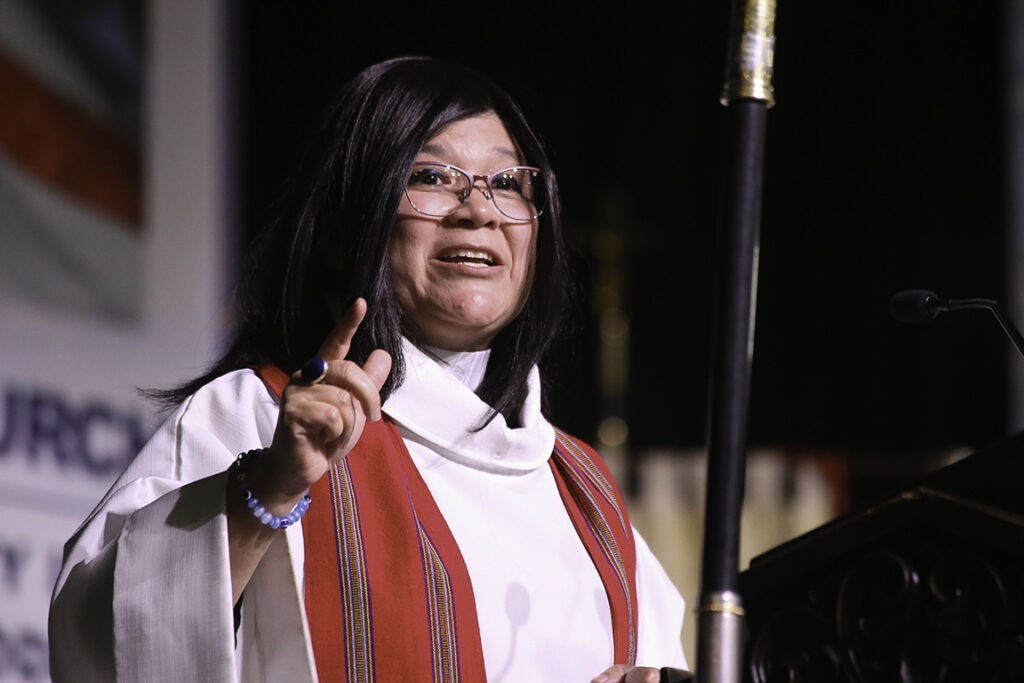
Norma Guerra, associate for formation and transitions ministry for the diocese, issued a call during her sermon for Episcopalians to stand beside marginalized communities. Photo: Janet Kawamoto
The uncertainty and fear experienced by many “and rightly so” is a call to action, said Guerra, diocesan associate for formation and transitions ministry. “There is much sacred work to be done,” she said, adding: “We will go.” Hundreds of delegates and guests responded “Yes!” in ever louder and stronger voices as she issued charge upon galvanizing charge:
“Will you stand with the immigrant, the refugee, the Dreamer and the asylum seeker?
“Will you stand with the LGBTQ and Trans community?
“Will you stand with people of color?
“Will you stand with our children and youth, whose future is uncertain?
“Will you stand with the women around this country who are afraid of losing their rights?”
Video of Heyward’s keynote address and Guerra’s sermon will be posted soon on the diocese’s YouTube channel.
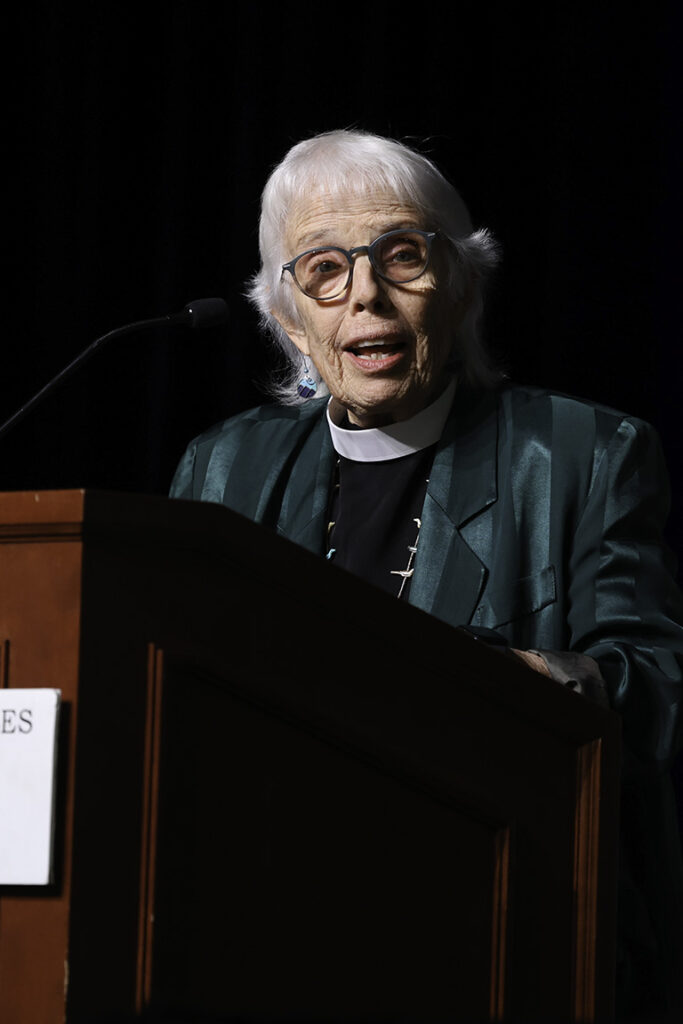
Carter Heyward delivers the keynote address during the convention. Photo: Mostyn Trudinger-Smith
Heyward: hearing ‘each other to speech’
The legacy of the Philadelphia Eleven will be “God is calling us, the church, the Jesus people, to be resilient, irrepressible movements in pastoral care, common prayer, and the cultivation of courage to work for justice and love, always and forever. Each of these three commitments strengthens the others,” Heyward told the gathering, amid applause.
As the contentious and vitriolic tone of the presidential campaign has spilled over into the lives of families and friends, it is morally imperative to ponder how to love through the hatred experienced on both sides, Heyward said.
She suggested three possibilities: by listening one another “to speech” or by being authentically present and speaking truth to those who are disagreed with; by finding or becoming a “bridge” person; and by resisting the nation’s drift toward the “Christo-fascism,” a term coined by German theologian Dorte Zola in the 1980s.
Christo-fascism involves the melding of evangelical Protestantism and socially conservative Catholicism with a white Christian nationalist agenda which “normalizes one leader’s omnipotence …” Heward said. “It becomes the way of the world, of the culture. Fascism is the state’s grabbing for absolute power over women’s bodies and over everyone’s voices, movements, associations, religious beliefs and practices.”
She continued: “It is the vocation of people of faith – that would be you and me … and others who love Jesus and justice to prove these fascist wannabes wrong,”
Fascism thrives amidst human indifference and, in Zola’s experience in Germany, people just turned themselves over to it, Heyward said.
But “the Spirit’s irrepressible movement for justice and love among her people will give us our strength every day,” Heyward said. “Our serenity, our courage and our wisdom as both Americans and Christians will be secured and sharpened by our standing together, not letting ourselves be isolated from our communities of resistance, including especially our churches. But, rather, a willingness to hear one another, in spite of differences, empowers radical mutuality, making each more fully human and more able to connect, she said.
The way to work our way through the hatred is by taking our opponents seriously and paying them the respect of inviting honest, kind, empathic and mutual engagement, Heyward said. “We tell them honestly how we experience their language, their behavior, and we ask them to tell us, if they will, how they experience us, our language, our behavior.”
And while a common tendency in the church is to engage service projects together, which is important, “it is not enough,” Heyward said. “It does not take the place of trying to share our values and trying to really be our honest selves. It needs to be done, but it’s not enough.”
And, as a church “we must go that second mile,” she continued. “We must ask the hard questions of each other, of our politicians, of our community leaders, knowing full well that we are likely to be caricatured and trivialized by some people who fear us.”
Heyward said hope is made up of courage and anger. Anger signals something is amiss in a relationship and is a first critical step toward transformation. “This is not a call to go out and hurt anybody,” she added. “We’re not asking people to be violent. But we are asking ourselves to help change the world. We are the Jesus people. We can do it, if we will.”
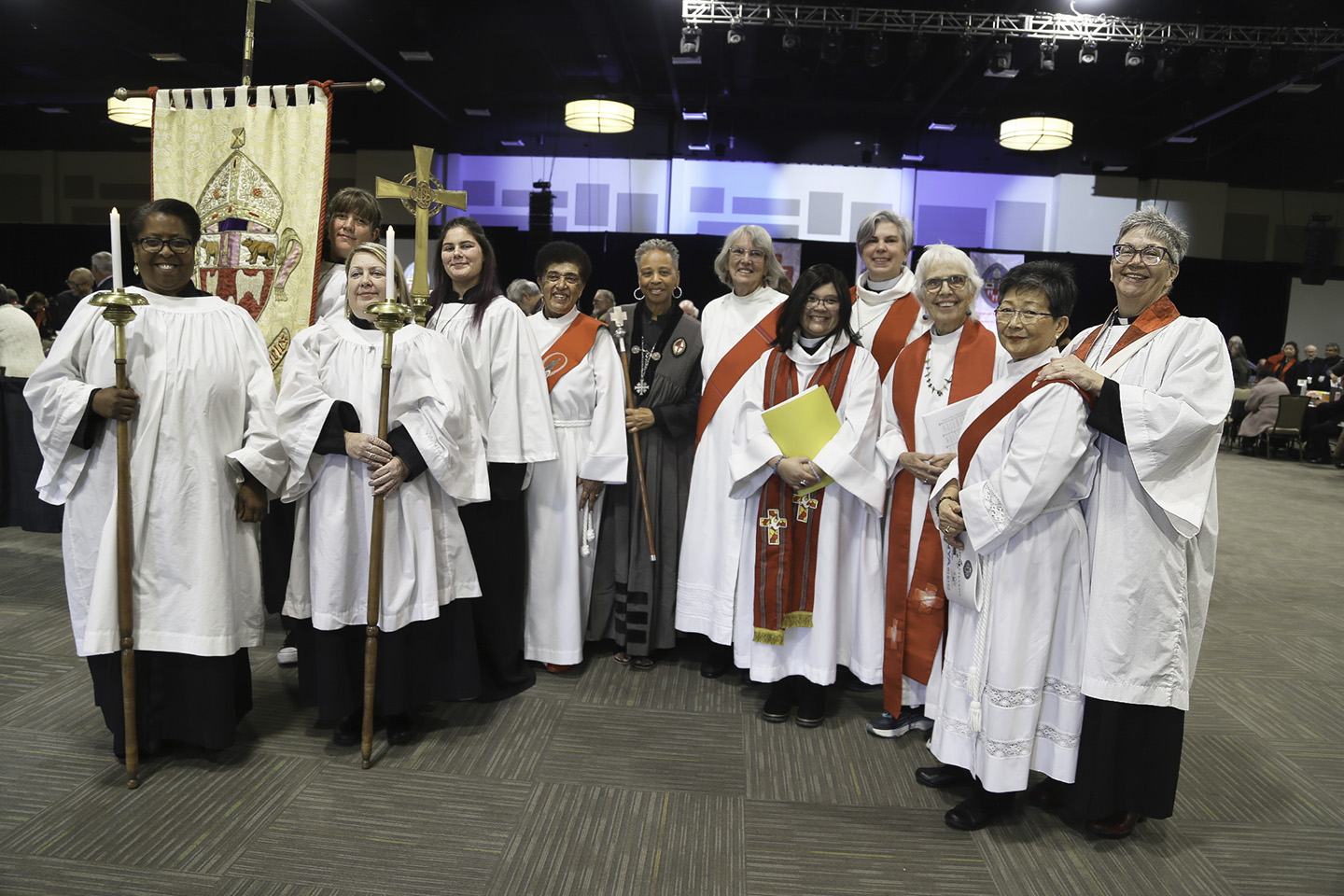
Ministers at the Eucharist were, from left: Felicia Gaddis, St. John’s Cathedral; Carrie Sunderland, All Saints, Riverside; Heather Kelly, St. John’s Cathedral; Michelle Fiemer, All Saints Riverside; the Rev. Karen James, Church of the Epiphany, Oak Park; Arlene Thompson, St. Luke’s, Long Beach; the Rev. Canon Joanne Leslie; the Rev. Norma Guerra; the Rev. Canon Melissa McCarthy; the Rev. Carter Heyward; the Rev. Sun-Hwan Spriggs, deacon at St. Paul’s, Tustin; and the Rev. Canon Kay Sylvester, rector of St. Paul’s, Tustin. Photo: Janet Kawamoto
Guerra: Where do you stand?
Guerra invited delegates to follow the examples s of such courageous women in the faith as the Philadelphia Eleven, Mary the mother of Jesus and Mary Magdalene, the Washington Four, and the Rev. Li Tim-Oi, the first woman ordained in the Anglican Communion 80 years ago.
The Washington Four – Lee McGee, Alison Palmer, Betty Rosenberg and Diane Tickell – were ordained Episcopal priests in 1975 in Washington, D.C., in what was then considered to be an unauthorized service.
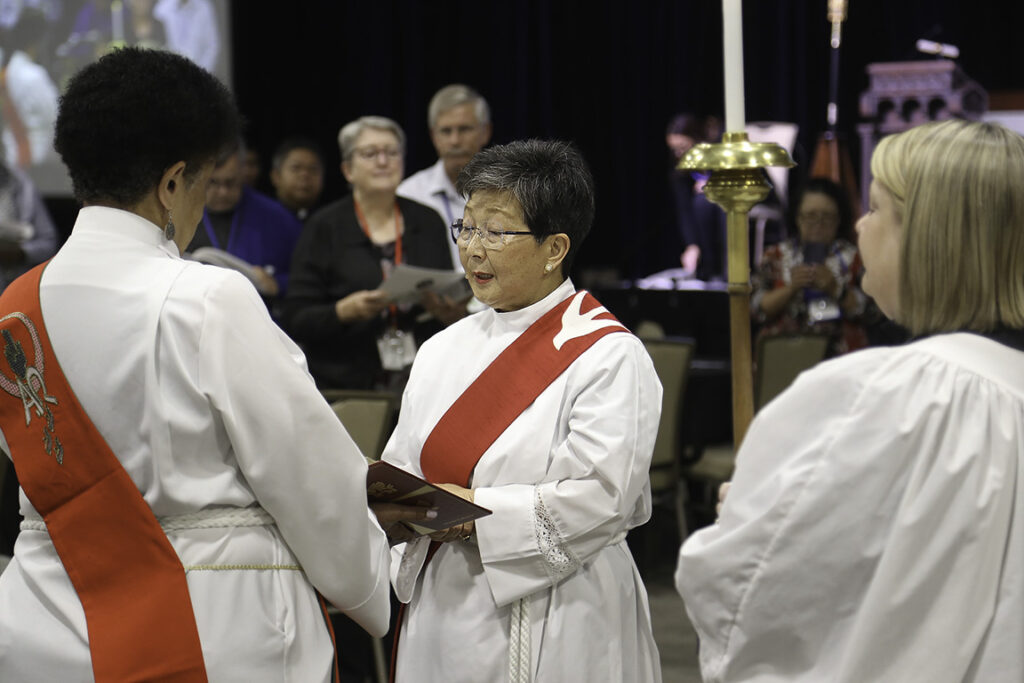
Deacon Sun-Hwan Spriggs reads the Gospel in Korean and English during the convention Eucharist. Photo: Janet Kawamoto
Tim-Oi’s ordination in Hong Kong on Jan. 25, 1944 was considered an emergency measure to ensure that Christians in Macau would not be without a priest during wartime. “As all the men were leaving the church, afraid, Florence Li Tim-Oi was ordained in the church to serve God and God’s people – another strong woman with deep faith and the unwavering commitment to serve,” Guerra said.
“And she did this for two years, until the people who left came back – and, of course, complained,” Guerra added amid laughter and applause.
“But she did not give up her priesthood, her call to be a pastor to God’s people. Just like Mary Magdalene and the other women and our Philadelphia Eleven and our Washington Four, she went and proclaimed the good news in Jesus and, eventually, in her late 80s, in Canada, she was restored to her priesthood.”
That resilience, courage and faith is demanded of people of faith today, given post-election realities. The election results, “makes me think, perhaps in some way, just how the disciples and Mary and the other women felt as they mourned and grieved their friend and teacher. Yet,” Guerra added, “they went to the tomb expecting to find death but instead they found new life.
“And this fills me with great hope, because we are Easter people. And God continues moving the stones away from our tombs. Because tombs are just that, a place for death. They are not places for the living. We will overcome this, and we will do it as the women did on that first day of the week.”
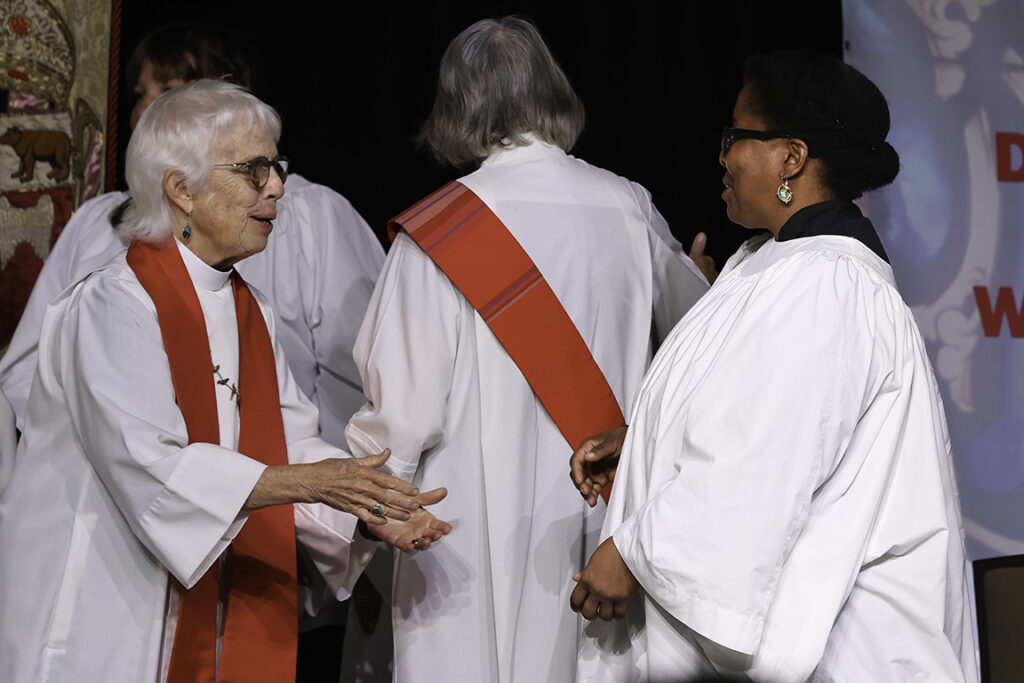
Carter Heyward and acolyte Felicia Gaddis exchange the Peace. Photo: Mostyn Trudinger-Smith
Studies show it takes women in the church longer to become rectors; they are less likely to be called to lead large congregations; and still face an earnings gap with their male colleagues, she said. “And things get harder if you are a woman of color.”
While “there are many rocks we must move from many tombs,” we can do so, she said. “We can go and proclaim a way of being that is shaped by the resurrection, that is everything that is life-giving. A way of being that is so countercultural, so demonstrative of mercy, so exemplary of the truth of Easter, that others will listen to us and will wonder and say; Wait a minute – did I just see the Lord?
“There is sacred work to do. So, my friends, just like Jesus told his disciples when he sent them in pairs to work to shake off the dust of their feet, we must shake the dust of our feet and get to work.
“We must do what the Philadelphia Eleven, the Washington Four and Li Tim Oi did. We must go and tell everyone that in The Episcopal Church, everyone is welcomed and loved and valued.
We must go and tell them that we stand with the oppressed and marginalized. We must go and tell them that we see Jesus in them. We must go and tell them that love is what matters. We must go and tell that no one is alone because we are at this together.
“And we will do this with God’s help.”
— The Rev. Canon Pat McCaughan is senior correspondent for The Episcopal News and vicar of St. George’s Episcopal Church, Laguna Hills.
